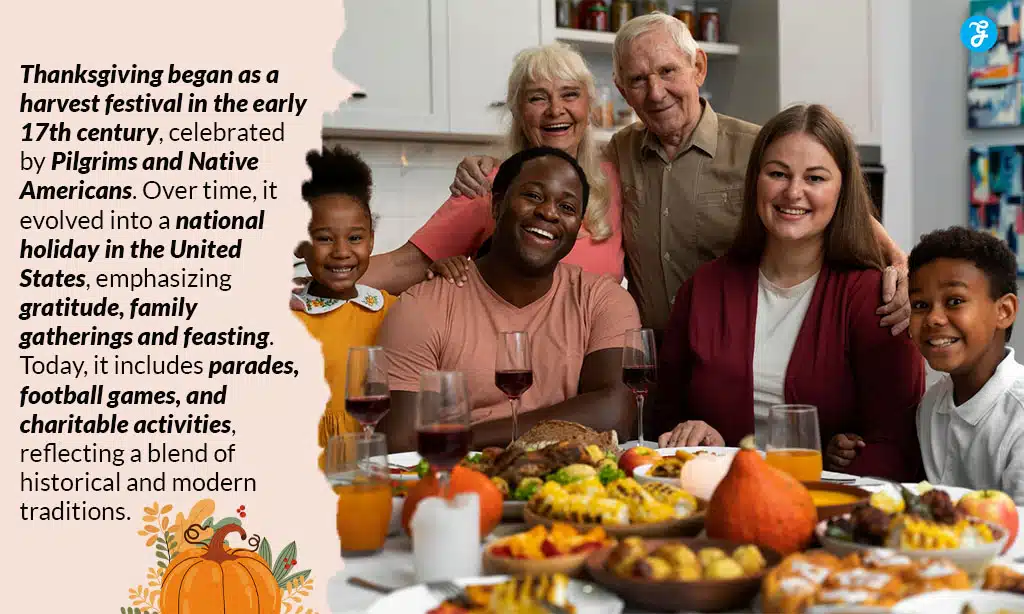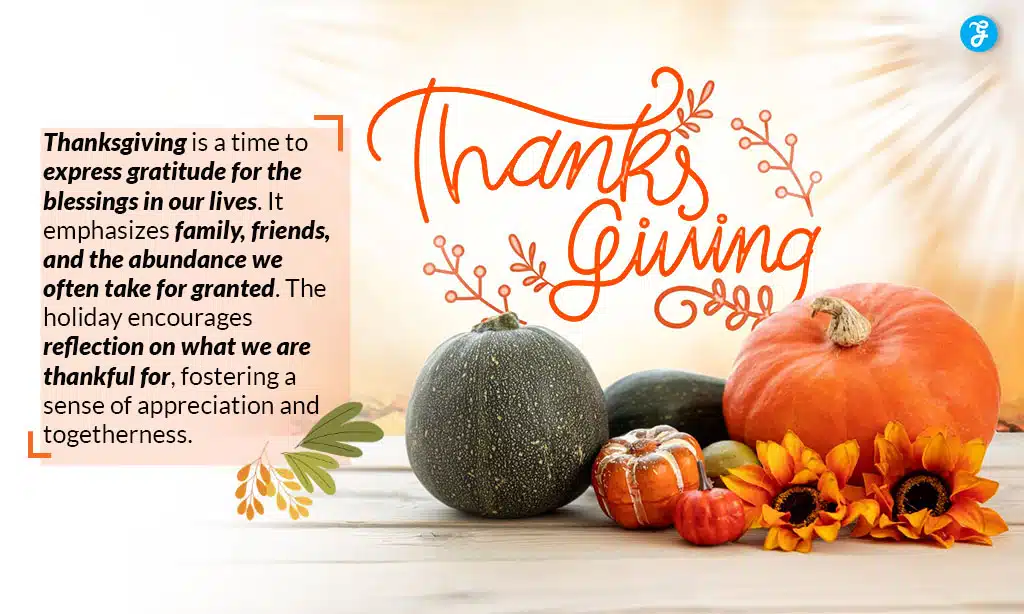Today, November 28, 2024, is considered Thanksgiving Day 2024 in the USA and some other nations.
Thanksgiving is a time of gratitude, togetherness, and reflection. It is one of the most cherished holidays, especially in the United States and Canada, bringing families together to share meals and give thanks. The holiday’s rich history spans centuries, rooted in harvest festivals and cultural traditions that have evolved significantly over time.
This article explores the origins, development, and modern significance of Thanksgiving while emphasizing the timeless importance of Thanksgiving gratitude.
The Historical Roots of Thanksgiving
Thanksgiving’s history is deeply tied to the harvest festivals celebrated by ancient civilizations and the events that shaped the early colonies in North America. Its origins are rich in cultural and historical significance.
Early Harvest Festivals Across Cultures
Long before Thanksgiving became an official holiday, many cultures held festivals to celebrate the harvest season. These events were an expression of gratitude for nature’s bounty and survival through the seasons.
- Ancient Civilizations:
Egyptians honored Min, the god of fertility and harvest, while Greeks celebrated Thesmophoria in homage to Demeter, the goddess of agriculture. Similarly, Romans observed the festival of Cerelia, marking the harvest of grain. - Native American Traditions:
Indigenous tribes across the Americas, such as the Iroquois, celebrated harvest ceremonies involving feasts, dances, and rituals to thank the earth for its gifts.
These celebrations reflect a universal human instinct to give thanks for abundance and survival, themes that later influenced the Thanksgiving holiday.
The First Thanksgiving in North America
The story of Thanksgiving in the United States begins in 1621, when the Pilgrims in Plymouth, Massachusetts, celebrated a successful harvest with the Wampanoag people. This feast is often referred to as the “First Thanksgiving.”
- Historical Context:
After a harrowing winter that claimed many lives, the Pilgrims were able to grow crops with the guidance of the Wampanoag, who taught them to cultivate corn, beans, and squash. The feast symbolized cooperation and gratitude. - What Was on the Table?
Contrary to modern traditions, the meal likely featured venison, wild fowl, fish, corn, and native fruits rather than turkey, stuffing, and pumpkin pie.
However, it’s important to acknowledge the complexities of this narrative, as the later history between settlers and Native Americans was marked by conflict and dispossession.
Thanksgiving Becomes a National Holiday
The journey of Thanksgiving from regional celebrations to a national holiday is a story of persistence, patriotism, and unity.
Early Celebrations in the U.S.
In colonial America, thanksgiving days were proclaimed locally to mark specific events, such as military victories or bountiful harvests. These observances often included religious services and community feasts.
Abraham Lincoln’s Proclamation
The turning point for Thanksgiving came during the Civil War. In 1863, President Abraham Lincoln, influenced by writer and activist Sarah Josepha Hale, declared Thanksgiving a national holiday. He set the last Thursday of November as a day for Americans to express gratitude and seek unity in a divided nation.
Shaping Modern Traditions in the 20th Century
As Thanksgiving entered the 20th century, it began to take on the form we know today:
- Macy’s Thanksgiving Day Parade (1924): The parade in New York City introduced a public spectacle that became an enduring tradition.
- Football Games: Teams like the Detroit Lions and Dallas Cowboys have made Thanksgiving football a staple event.
- Black Friday: The day after Thanksgiving emerged as the unofficial start of the holiday shopping season, drawing millions of shoppers to stores.
Gratitude as a Universal Theme
While Thanksgiving is most commonly associated with North America, the concept of giving thanks is a universal human experience.
The Evolution of Thanksgiving’s Meaning
Over time, Thanksgiving has evolved from a purely harvest-based festival to a celebration of family, community, and gratitude. In today’s multicultural society, the holiday embraces diverse traditions, with families adding their unique cultural dishes and customs to the table.
Global Observances of Gratitude
Gratitude transcends borders, with various cultures around the world celebrating their own versions of Thanksgiving:
- Canada: Thanksgiving is observed on the second Monday of October, reflecting the earlier harvest season.
- Japan: Labor Thanksgiving Day on November 23 honors workers and the fruits of their labor.
- Europe: Harvest festivals in countries like the UK and Germany emphasize sharing and community.
Thanksgiving 2024 Dates
- United States: Thursday, November 28, 2024
- Canada: Monday, October 14, 2024
- Liberia: Thursday, November 7, 2024
- Grenada: October 25, 2024
- Japan (Labor Thanksgiving Day): Saturday, November 23, 2024
Thanksgiving 2024 offers a fresh opportunity to embrace gratitude, connect with loved ones, and create lasting memories.
Thanksgiving in the Modern Era
As society evolves, so too does the way Thanksgiving is celebrated. Modern practices highlight family, fun, and reflection.
Family, Food, and Fun
The heart of Thanksgiving lies in family gatherings. Traditional meals feature roast turkey, mashed potatoes, cranberry sauce, and pumpkin pie. Beyond food, the holiday is marked by:
- Parades: The Macy’s Thanksgiving Day Parade remains a televised favorite.
- Football Games: Watching the NFL Thanksgiving games is a beloved tradition.
- Volunteerism: Many use the holiday to give back through community service.
Commercialization and Critiques
Thanksgiving has not escaped the effects of commercialization.
- Black Friday Sales: Once a day of rest, Thanksgiving now leads directly into the shopping frenzy of Black Friday.
- Cultural Critiques: Increasing awareness of Native American history has sparked discussions about how Thanksgiving should be celebrated more inclusively.
Gratitude Beyond the Holiday
Thanksgiving inspires many to practice gratitude year-round. Simple acts like journaling, expressing appreciation, and giving back to the community can foster ongoing positivity and well-being.
Thanksgiving and Gratitude: Why It Matters
Gratitude has profound psychological and emotional benefits. Studies show that regularly practicing gratitude can:
- Improve mental health by reducing stress and increasing happiness.
- Strengthen relationships through expressions of appreciation.
- Enhance physical health, including better sleep and reduced illness.
Takeaways
From its humble beginnings as a harvest feast to its current role as a day of gratitude and togetherness, Thanksgiving remains a celebration that unites people across generations and cultures.
As we gather with loved ones this Thanksgiving, let’s reflect on our blessings and commit to practicing gratitude not just on this day but every day.







































